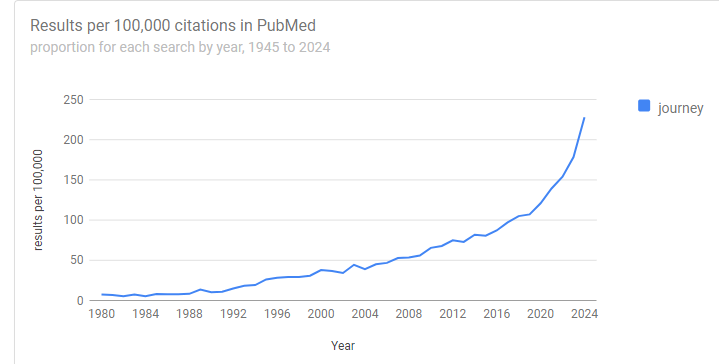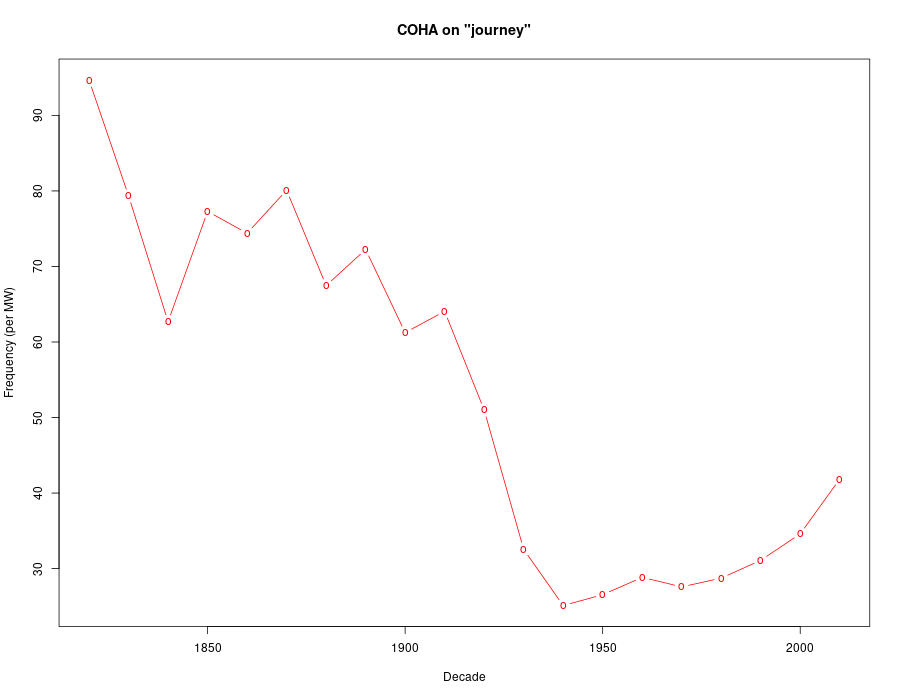Our journey journey
« previous post | next post »
In "Peevable words and phrases: journey", 5/18/2024, Victor quoted Lisa Miller, "When Did Everything Become a ‘Journey’?", NYT 5/16/2024:
According to the linguistics professor Jesse Egbert at Northern Arizona University, the use of “journey” (the noun) has nearly doubled in American English since 1990, with the most frequent instances occurring online.
In PubMed, where we've been tracking other changes in word frequency lately, the change from 1990 to 2024 in the frequency of "journey" was 10.2 to 227.9 (per 100k articles), or a factor of 22.3 — which is a lot more than doubling:
And the rise has been going on long enough that we can't blame it on LLMs…
In the Corpus of Historical American English, the frequency of "journey" has been increasing since the 1940s (though the change between 1990 and the 2010s is more like 1.5 than 2, much less 22…) But before that, the frequency of "journey" fell pretty steadily from the 1840s onwards — and especially sharply after 1910. Perhaps this is because railroads and then the automobile turned lots of what used to be "journeys" into mere local trips?
Note that the first gloss for "journey" in Webster's 1828 dictionary is "The travel of a day", which makes sense since the etymology is from Latin diurnus. And a reasonable day's travel would have been maybe 10-15 miles on foot, and maybe 20-30 miles on horseback — whereas an automobile on decent roads could do 20-30 miles in less than an hour.
Google ngrams shows a similar pattern — with a factor of 3 from 1990 to 2019 :
(I've asked the site to multiply by 10000 since that turns percentages into more useful frequency-per-million-word values.)
If you look at a sample of PubMed's recent contexts for "journey", you may get a clue about why the increase in frequency is so much greater there than in COHA and Google ngrams.



Benjamin E. Orsatti said,
July 10, 2024 @ 1:47 pm
Uh, guys… Think that the post-1980 spike might have anything to do with… https://en.wikipedia.org/wiki/Journey_(band) ?
Cervantes said,
July 10, 2024 @ 2:12 pm
Yes, even before I clicked on the link I guessed that it was because of the increasing publication of qualitative research. This is often based on semi-structured interviews or focus groups and it seeks to capture the experiences of people, such as patients living with a chronic illness, or providers adapting to their profession. The idea that they go through a transformation of some kind, often metaphorically called a journey, is very common. And, of course, explor* is likely to be associated with this as well. No need to blame AI, in fact this is one kind of paper that I expect it wouldn't be any use for.
teece303 said,
July 10, 2024 @ 2:18 pm
This so probably a dumb question, but isn’t “most frequently online” a useless qualifier?
How does one measure non-online uses?
And how does one account for what, seems to me, to be an inescapable over-measurement of online vs offline?
Brett said,
July 10, 2024 @ 4:10 pm
I had noticed this change in usage, but I mostly attributed it to British influence. With the globalization of English-language media, a lot of British locutions have become more common in North America, and this seemed to be one of them.
Mark Liberman said,
July 10, 2024 @ 4:55 pm
@Brett: "I had noticed this change in usage, but I mostly attributed it to British influence. "
There's apparently some truth to the idea that "journey" has historically been more common in British than in American English — from Google Books ngrams:
Maybe car culture advanced further and faster in the U.S., and then the new metaphorical gloss helped us catch up in "journey" frequency?
AntC said,
July 10, 2024 @ 5:25 pm
@Brett I mostly attributed it to British influence
Do you have any actual evidence this is a particularly British word? myl cites Webster's 'AMERICAN DICTIONARY of the ENGLISH LANGUAGE' 1828 (whose example is from Genesis 1539 King's Bible) and PubMed "An official website of the United States government".
The 1959 movie 'Journey to the Centre of the Earth' seems to be an impeccably U.S. production.
As @Cervantes notes, a trend over the last several decades is 'Patient Journey' in healthcare. All the jargon on that wiki page and links from it seems to have originated in U.S. (IDS as a formally denoted 'business model' might be a decade or so old, but note that page uses 'patient journey' as a already-common term of art. I'd certainly heard it in healthcare in the '90's.)
Or are you talking about this globali(z/s)ation having happened at some indefinite time since 1589? 1828? 1913? 1959? See LLog anon under 'Recency Effect'.
JPL said,
July 10, 2024 @ 6:27 pm
I suggest that you look at the phenomenon of the word 'journey' in the context of the phenomenon of the passage of the "saying" (which I guess originated in an expression of Emerson's), "It's not the destination, it's the journey", through post-flower-power spiritual quest to pseudo-esoteric "new age" tropes, to Dr Chopra and Oprah, to sitcoms, advertising and finally PubMed. The "new age" gurus said, "You've been thinking about things all wrong; here's a new way of looking at life: "It's not the destination, it's the journey". And voila, just by repeating that expression, now everybody repeats it, and thinks about everything in that way. Now, if we can only have that happen with, "And the second is like unto it; thou shalt love thy neighbour as thyself".
JPL said,
July 10, 2024 @ 6:35 pm
The above was before seeing AntC's comment, but many of the PubMed examples seem to be using this trope.
AntC said,
July 10, 2024 @ 6:53 pm
using this trope
Thanks @JPL. The 'patient journey' (if it's a trope) in a healthcare setting is not so new-age. It's to encourage healthcare practitioners to see themselves as part of a *system* (from the patient's point of view), rather than a fragmented/competing bunch of specialisms. And whilst it's nice to be nice to patients, the emphasis is on efficiencies/saving healthcare costs for the healthcare insurer (in U.S.) or public funder (in all civilised countries).
My earlier questioning was before seeing myl's ngram; but out of the same wish to not let stand an unsupported impressionistic claim.
David Marjanović said,
July 11, 2024 @ 7:23 am
Somehow I had never noticed that journey is journée…
Benjamin E. Orsatti said,
July 11, 2024 @ 7:55 am
David,
So, it originally meant what we might call a "day-trip"?
J.W. Brewer said,
July 11, 2024 @ 8:10 am
This discussion of the noun made me curious about the verb "to journey," and indeed the google books ngram viewer shows both "journeyed" and "journeying" having more than doubled in rate of usage since bottoming out in the early 1980's (having by 2019 returned to approximately where they'd been a century or so previous), so perhaps a parallel trend. OTOH, the good old noun "journeyman" has continued its long-term decline.
David Marjanović said,
July 12, 2024 @ 3:18 pm
That's what the OP says:
Victor Mair said,
July 12, 2024 @ 3:49 pm
Beatles, "Day Tripper"
https://www.youtube.com/watch?v=2IbPn5j2YKk
Love the opening guitar riffs.
JPL said,
July 12, 2024 @ 6:48 pm
Thank you Victor! For me it's the vocal harmonies: on "For takin' the easy way out", and in fact in the whole song. Do we have an example of such adventurous harmony in today's music?
JPL said,
July 12, 2024 @ 7:22 pm
"Sunday driver, yeah"
The day trip starts out from home, ventures out and comes back home; it really is more about the "path" (reminds me of Talmy). The kind of trip the "new age" metaphor seems to describe more often is one where the destination is different from the origin, and includes the purposeful struggles to reach it, so the part between, e.g., Samoa and Hawaii becomes pretty significant.
Rodger C said,
July 13, 2024 @ 11:56 am
In Spanish, jornada still means the distance one can travel in a day, thence a stretch of road between inns; hence the infamous Jornada del Muerto near Alamogordo, NM.